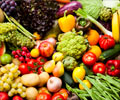Men who eat large amounts of fruits and vegetables have good seminal quality, a new study has found.
According to the research, which was carried out in two infertility centres in Alicante and Murcia, low antioxidant intake is associated with low reproductive capacity in semen."Our previous research study, published in March, showed that men who eat large amounts of meat and full fat dairy products have lower seminal quality than those who eat more fruit, vegetables and reduced fat dairy products.
"In this study, we have found that people who consume more fruits and vegetables are ingesting more antioxidants, and this is the important point," Jaime Mendiola, lead author of the article and a researcher at the University of Murcia, tells SINC.
The experts have spent the past four years analysing the link between dietary habits or workplace exposure to contaminants and the quality of semen among men attending fertility clinics.
The objective was to find out whether a higher or lower intake of vitamins, which act as antioxidants, could affect semen quality. These molecules, which are present in foods such as citrus fruits, peppers and spinach, work by lowering the level of oxidative stress that can affect semen quality, and improve sperm concentration parameters as well as sperm mobility and morphology.
The study was carried out among 61 men, 30 of whom had reproductive problems, while the remaining 31 acted as controls.
Advertisement
"A healthy diet is not only a good way of avoiding illness, but could also have an impact on improving seminal quality. What we still do not understand is the difference between taking these vitamins naturally and in the form of supplements," the Spanish scientist said.
Advertisement
Source-ANI
LIN















